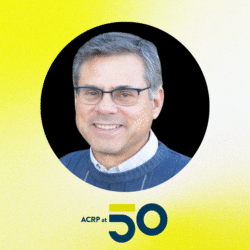While questions about what decentralized clinical trials (DCTs) are have been largely resolved in the minds of most clinical research professionals by now, the reactions to several polling questions on Sunday (April 30) from attendees at the ACRP 2023 conference in Dallas, Texas, suggest strongly that opinions in the field on some aspects of how, when, and why they should be implemented remain divided.
On-the-spot responses from a room filled with hundreds of affected professionals showed nearly all agreed that the regulatory requirements on DCTs are not really helping them guide their implementation—with nearly 50% saying the regulations are “clear as mud” and nearly 50% saying they wish someone would “send help” for dealing with the challenges posed.
As to whether DCTs save study teams time in conducting research, 66% of the respondents said they are “not sure” and 32% said “no way!”
Also, when asked if study budgets at their sites accurately reflect the time and effort needed for DCTs, 83% of respondents said “not even close” and 17% said it’s “not so bad—we can live with it.”
Further, a full 50% of respondents said they are “still unsure” whether they believe that DCTs are good for patients, while 42% said “yes” and 8% said “no.”
Panelists posing and providing insights on the quick polling responses included moderator Catherine Gregor, MBA, CCRP, CCRC, Chief Clinical Trial Officer, Florence Healthcare; Paul Ivsin, Senior Vice President, Analytics, Insights & Media, Continuum Clinical; David Morin, MD, FACP, CPI, FACRP, Director of Research, Holston Medical Group; Caroline Redeker, Senior Vice President, Corporate Development, Advanced Clinical; and Adam Samson, MS, PMP, CCRA, CCRC, CCDM, Head of Clinical Delivery Operations, RWE Clinical Trials, Walgreens.
Earlier on Sunday, DCTs were also part of the mix of topics when Eric S. Pittman, MBA, Program Division Director, U.S. Food and Drug Administration (FDA), Office of Bioresearch Monitoring Operations (BIMO)—West, discussed “The Future of FDA BIMO Inspections: Are You Prepared?”
One big advantage of DCTs is that they can bring populations of people not normally available to participate in clinical trials into them, Pittman noted. However, he added, the current drawbacks of DCTs include how immature they are in terms of their digital infrastructure and lessons learned from conducting them. Further, potential practitioners of DCTs often perceive that there are regulatory barriers to their use and questions remain about consistency in protocol execution and data reliability and integrity in DCT settings.
FDA looks forward to having more researchers running DCTs so that the agency can learn more about them based on their experiences, Pittman told his audience. Among other topics, Pittman also addressed how BIMO investigators who inspect study sites are now receiving hands-on training on the latest technologies being used in clinical trials from FDA’s Office of Digital Transformation and Product Centers, from academic medical centers, other governmental divisions, and even the companies behind certain widespread products.
Such training “gives our investigators real comfort that they know what they’re going to see when they go out for a visit” to validate technologies being used at a site, Pittman noted. “By partnering with these organizations, we learn their systems and technologies [to better understand their operations] within the clinical and non-clinical field. This is the future of” BIMO, he added.
Author: Gary Cramer




